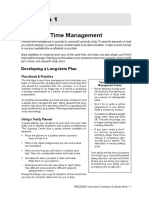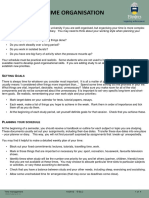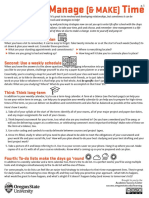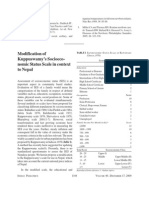Learning to say no
Youve planned your termly and weekly schedules; youre working as effectively as you possibly can; youve found ways of dealing with the things that distract you - but you still dont have enough time! Maybe youre just trying to do too much. Learn to say no University study is a significant commitment, like doing a full-time job you know how hard youre working. If you feel that you have to take on extra tasks to prove that youre doing something useful, youre tacitly agreeing with the people who think that youre only a student. Value yourself and value your studies. You only have a short time at university, and youve worked hard to get here. You deserve to give yourself the time to do your best. Remember: Youre not expected to read everything on the reading list. If you dont organise the social/game/party, it will probably still happen. And if it doesnt, the world wont stop. If it needed an immediate answer, it probably wouldnt be on email. A real friend wont mind waiting a bit longer to chat. An un-vacuumed floor doesnt make you a bad person.
Effective Study Guides
What stops you from managing your time?
Managing your time 3
This guide is the third of three looking at ways of organising yourself and your time. It includes advice on: Thinking about your goals and setting targets Dealing with distractions Learning to say no
I know what to do, but I cant make myself do it.
Many of the strategies needed to get time under control are obvious: for instance, making a timetable. So why dont we do them?
All my deadlines are at the same time why cant the tutors spread them out? Take control - set your own deadlines to spread work out. Im just naturally disorganised I always have been! - Organisation is a set of practices that can be learned not an innate skill. My friends/family/teammates rely on me to get things done who will do it if I dont? Someone else? Maybe theyve never been asked? Its so much easier to waste time than to use it for study. Its not so easy when you end up with two days to research and write three essays.
For more information, see
Managing your time 1. Getting organised. Managing your time 2. Making more hours in the day.
www.learnhigher.ac.uk/learningareas/timemanagement/introduction.htm
For more on this and other aspects of academic study, see our website at www.rdg.ac.uk/studyadvice Dr Kim Shahabudin, Dr Angela Taylor, Dr Judy Turner & Dr Michelle Reid. University Study Advice team & LearnHigher CETL (Reading).
The only person responsible for managing your time is you. Setting targets, avoiding distractions and learning to say no will help.
�Thinking about goals and setting targets
The fact that youve picked up this leaflet means you want to learn how to manage your time better when studying, so you are already taking responsibility. The next step is to think about why: what are your goals? Your long-term goals might be things like: Become a graduate Make myself more employable Get a job doing something I enjoy Prove to myself (and others) that I can do this To do these, you have to achieve some medium term goals: Improve my study practices to get better marks Get my work under control so I feel less stressed Make a study timetable that works so I can balance my work/life commitments better Meet my assignment deadlines so I dont fail my module
Dealing with distractions
It can be difficult to focus on studying when your mobiles ringing, new emails keep popping up, the washing-up needs doing and your friend wants you to go for coffee. On top of that, you found a really interesting website while researching your assignment If you make yourself aware of the things that distract you from studying you can think in advance about strategies to deal with them. Use the time-use diary technique in Managing your time 2. Making more hours in the day to see what is really soaking up your time. Then decide how to manage them. For instance: Stay focused on reading by thinking about the questions you need answers to (e.g. What are the main points of/objections to this theory?) and looking for answers. Break down reading to one paragraph at a time, and write any notes at the end of each. If you find yourself spending a lot of time on a particular website, use a website-blocking application like LeechBlock to control the time you spend on it. (Link on Study Advice website.) You wont be motivated if you feel like youre studying all the time. Fix times when you wont study and set an alarm for the end of each study or leisure period to remind you to stop and change mode. If your friends keep interrupting you, set a definite time and place to have a break and go for coffee together. Put the voicemail on and fix times when you will return phone calls or read and answer emails. Disable the pop-up alert on your email so youre not tempted to read them as they arrive. Alternatively, if you dont have the alert enabled and that means that you keep checking, try switching it on to see if that makes you more focused on the task at hand. Some people prefer to do chores like washing-up and shopping first thing in the morning so they have a clear day ahead. If you do this, have a fixed finish time so they dont spread out to fill the whole morning. It might be better to keep chores for your worst time of day for thinking after lunch for most people. Use your best thinking time for studying.
You can break these down again into short-term targets: Learn how to plan my essays; arrange session with a Study Adviser. Make a list of everything I need to do; think about what I could leave out; prioritise whats left. Print off a week planner grid and write in my commitments; book my study periods into the gaps; try it for a week, amend if necessary. Get organised earlier; list all my deadline dates and set some artificial deadlines if necessary; list tasks needed, and when I need to start; tick each task off as I do them. Not everything works for everyone so see a Study Adviser if you want to talk your ideas through.
What are your goals and targets?
Draw up a table with three columns. List long-term goals in the first; what you have to do to achieve them (i.e. medium-term goals) in the second, and short-term targets to aim for in the third. Tick each off as theyre completed.
















































































